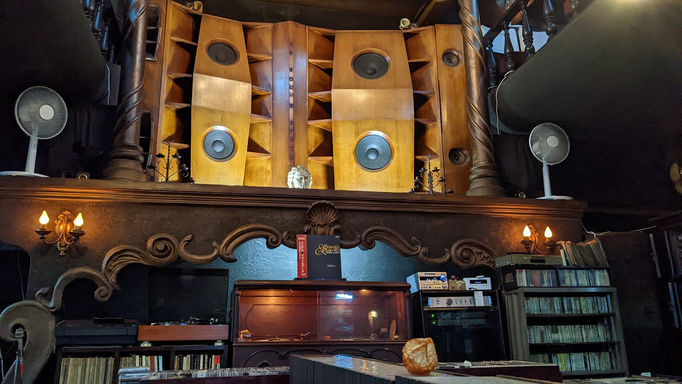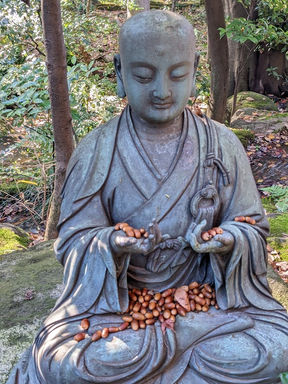
Israel Ministry of Foreign Affairs

時に奇跡は起こるもの…
ウズィ・ヴァイルの日本滞在記
2022年秋、千葉県松戸市のアーティトインレジデンスに滞在したイスラエル人作家ウズィ・ヴァイル。作品集『首相が撃たれた日に』の出版を機に平野啓一郎氏とも対談。そのヴァイルが日本の印象を、独特なスタイルで語る。
―ウズィ・ヴァイル(作家)
時に奇跡は起こるもの…
常に起こる訳ではない。それに、奇跡を期待している時にはなおさらだ。だが、それは2ヶ月前、日本を訪問したときに私に起こった。私は駐日イスラエル大使館から誘いを受け、千葉県松戸市の「Paradise Air (パラダイスエア) 」のプログラムに参加、しばらくそこに滞在することができた。それは穏やかで静かな、それでも疑いようのない奇跡だった。
それは有名な日本の秋ではなく…
私は10月に来日した。自然は完全に秋モードに入っていた。時にとても美しく、時に奇妙でもあった。宮島でのある夜、私は人気のないビーチにいた。暗闇が私を覆い、優しげな鹿たちが通り過ぎる。稲光の中、海に浮かぶ鳥居を眺めながら、私は劇中にいるような気持ちになった。作家はどこかに消え、監督の姿も見えない。鹿たちが舞台俳優だ。美しさは現実離れするときがある。
それは有名な日本食ではなく…
日本では今まで存在さえ知らなかった食べ物を食べたが、恐らく後生その味を忘れることはないだろう。一度、広島でお好み焼きを食べた。とても美味しかったが、数日後に私はある間違いを犯すことになる。私は東京で小さなカフェを経営する老婦人に、一番好きな日本食はお好み焼きだと話した。実際にそうではなかったが、彼女の質問に対して、1つだけ好きな食べ物を選ぶことが、どうしてできただろうか?だが、私はそのチョイスを間違ったようだ。彼女の表情はやさしい同情に代わり、即座に無料で食べ物を提供しようとしてくれた。彼女は私がお金を持ってなく、まともな食事をしてないと思ったようだ。
それは文化でもなく…
私のようなカルチャー大好き人間にとって、日本は24時間年中無休の文化のディスニーランドだった。私は幸運にも、銀座の歌舞伎座に招待いただいたことがあった。以前にテレビやYouTubeなどで歌舞伎を観たことはあったが、実際に観た舞台は全く想像だにしないものだった。驚くほど正確な演技、指一本の動きが考え抜かれた演出だった。12人の三味線奏者が舞台で一斉に奏でる音。エレガントな過去が、必然的に現代に蘇る。私の脳の片方は、「どうしたらこれを現代劇に転換できるだろう?」と考えつつも、もう片方は「黙って何も考えずに、ただ楽しめ」と、私にささやき続けた。
だが、私にとっての奇跡とは、何よりも人々だった
2ヶ月の滞在中、私は思いもよらない人々と出会った。それは主に、大使館文化部のお陰で実現したものだった。彼らはわざわざ私を適材な人と繋いでくれ、的確な提案だけでなく、出会いのチャンスを作ってくれた。またそれは、私が日本滞在2日目にして、“場所より人”という決心をしたことにもよったのだと思う。
素晴らしい田舎はいつも変わらない。偉大な文化は移り行く。しかし、日本人と長い時間、腹を割って語り合うチャンスは、今後私に訪れるだろうか?東京の芸術家から神戸の蔵元まで、様々なバックグラウンドの、全く違ったストーリーを持った、年齢もバラバラな人々と会うことなど、これからもあり得ようか?
だから、私はできるだけ人に会おうと努力した。2ヶ月間、見知らぬ土地でよそ者として、全く一人で、一生忘れることのない出会いを、点で結んでいった。
長い間一人でいると、自分が何者なのかを強く意識するようになる。そして、そんな自分に安心感を覚えれば覚えるほど、他人にもより心を開くようになり、思いがけない出会いがある。
日本での時間が過ぎるにつれ、私の被害妄想のような心配は取り払われていったように思う。反対に、実は人々は陰で私に親切にしようとしてくれているのだと、はっきり分かってきた。天気にも嘘のように恵まれた。そんな天気にも慣れてしまった。私は一体これからどうしたらいいんだ?
天気は別にして、これらすべてを可能にしてくれた人たちがいる。
‐彼らには感謝してもしきれないのだ。
(翻訳:宮森久子)

ウズィ・ヴァイル
1964年、ホロコースト第二世代としてイスラエルのキブツで生まれ、1歳でテルアビブに移る。作家・コラムニスト・脚本家・ジャーナリスト。1991年『首相が撃たれた日に』で作家デビュー、E・ケレットやO・カステル=ブルームと同じポストモダン世代に属す。1990年から「ハ・イル」紙の風刺コラム「裏表紙」を担当し始め、タブーなテーマを率直に扱う人気作家として注目される。翻訳家としてR・カーヴァーやM・ストランドなどの作品を訳すほか、児童書や絵本も多数手がけている。長篇に『五つの夢』『世界を消した男』など、短篇集に『嘆きの壁を移した男』『しあわせ』など。テルアビブ在住。
平野啓一郎氏とのイベント履歴は、本サイトの『EVENT』コーナーをご覧ください。













